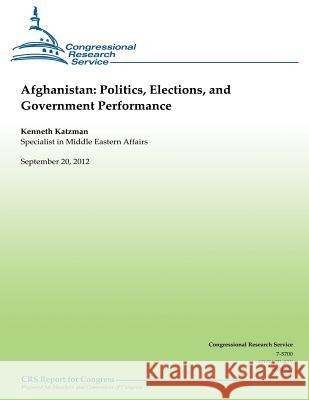Afghanistan: Politics, Elections, and Government Performance » książka
Afghanistan: Politics, Elections, and Government Performance
ISBN-13: 9781481165570 / Angielski / Miękka / 2012 / 68 str.
Afghanistan: Politics, Elections, and Government Performance
ISBN-13: 9781481165570 / Angielski / Miękka / 2012 / 68 str.
(netto: 56,66 VAT: 5%)
Najniższa cena z 30 dni: 59,49
ok. 16-18 dni roboczych.
Darmowa dostawa!
Building capacity and limiting corruption at all levels of Afghan governance are crucial to the success of a planned transition from U.S.-led NATO forces to Afghan security leadership. The capacity of the formal Afghan governing structure has increased significantly since the Taliban regime fell in late 2001, but nepotism is entrenched in Afghan culture and other forms of corruption are widespread. Afghan President Hamid Karzai has accepted U.S. help to build emerging anti-corruption institutions, but these same institutions have sometimes caused a Karzai backlash when they have targeted his allies or relatives. At a donors' conference in Tokyo on July 8, 2012, donors pledged to aid Afghanistan's economy through at least 2017, provided Afghanistan takes concrete, verifiable action to rein in corruption. On July 26, 2012, Karzai appeared to try to meet his pledges to the Tokyo conference by issuing a "decree on administrative reforms"-a document of sweeping policy directives intended to curb corruption. Partly because of corruption in the Afghan security forces, on August 4, 2012, the National Assembly voted to remove the ministers of interior and of defense; they have been replaced.
Zawartość książki może nie spełniać oczekiwań – reklamacje nie obejmują treści, która mogła nie być redakcyjnie ani merytorycznie opracowana.











